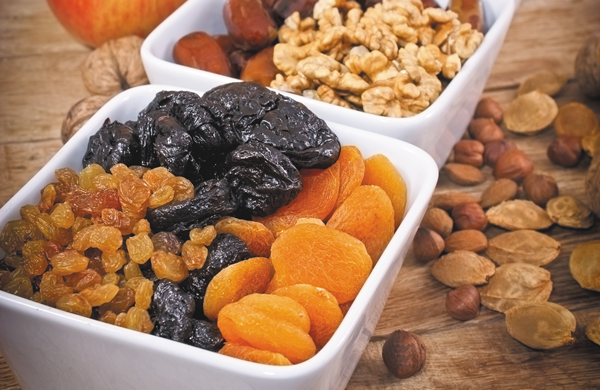
New thinking about plaque in arteries that feed the brain

Want to prevent shifting teeth? Maybe you need retainers

What you need to know about the new dietary guidelines

Food that’s healthier for people and planet can be cheaper, too

New evidence that polyphenol-rich foods help the heart

8 simple ways to reduce ultra-processed foods in your diet

How to curb your stress eating

How to spot Parkinson’s disease symptoms

Heart failure symptoms in women: How they’re different

GERD diet: Foods to avoid to reduce acid reflux
Diet & Weight Loss Archive
Articles
Ask the doctor: Are activity trackers worthwhile for weight loss?
If wearing an activity tracker results in more daily exercise but not a significant weight loss, it still provides health benefits.
How to cut back on sugar and salt
Most Americans consume much more than the recommended levels of sugar and salt. However, you can retrain your palate to be satisfied with less of both.
Image: tsvibrav/iStock
If you own a sugar bowl and a saltshaker, you may be wondering if you should ever fill them again. The panelists crafting the 2015–2020 Dietary Guidelines for Americans emphasized that we're consuming much more sugar and salt than is healthy for us and have advised us to pare our intakes of both considerably. That said, they have acknowledged that the sugar bowl and saltshaker aren't the principal villains at the dining table. About 80% of the sugar and salt we eat is added to packaged and commercially prepared foods.
What are added sugars?
Reducing your sugar intake
Although beverages are the most important source of added sugars, they aren't the only ones. There are additional ways to reduce your intake of added sugars, and it doesn't have to mean giving up desserts. Here are several ideas for reducing the amount of sugar in your diet, targeting sugary drinks just as a first step:
Give your taste buds time to adjust. If you're in the habit of having two spoonful's of sugar in your coffee or tea, for instance, start by going to one-and-a-half for a week, then down to one. If sodas are part of your regular routine, cut your consumption by one a week, then two.
Adapt your recipes. You can make your favorite recipes less sugary by reducing a little bit at a time—try using one-quarter less sugar than the recipe calls for, then one-third—right up until you notice the difference. You may come to prefer the less-sweet variation.
Reach for fruit rather than juice. Squeezing fruit breaks down the cells and releases sugar into the juice, so that it enters the bloodstream more rapidly. Moreover, a glass of juice is usually the caloric equivalent of three whole fruits. Instead of drinking fruit juice, eat a piece of fresh fruit. You can make fruit drinkable and still preserve its fiber by blending it with almond milk or low-fat yogurt in a smoothie. If you just can't give up juice, make it 100% fruit juice that is not sweetened and limit the amount to a 4-ounce glass.
Check your cereal box. If you enjoy cold cereal or instant oatmeal for breakfast, look at the labels and choose one with minimal added sugar. It's also worth noting that cereals made with refined grains are quickly broken down into sugars in the body. To wean yourself off your favorite cereal, try combining it with a whole-grain, high-fiber cereal, and add fruit.
What about salt?
Cutting down on salt
Even if you ban salt from your table, it is still easy to exceed the sodium limit. To avoid doing so, try the following:
Eat mostly fresh foods. Most of the sodium we eat comes from restaurant meals and processed foods, including canned vegetables and soups, pasta sauces, frozen entrées, lunch meats, and snack foods. If you start with unsalted, fresh foods and prepare them yourself, you can exercise better control over your sodium intake.
Take care with condiments. Sodium is found in many condiments besides ordinary table salt—including soy sauce, Worcestershire sauce, salad dressings, ketchup, seasoned salts, pickles, and olives. Baking soda, baking powder, and monosodium glutamate (MSG) also contain sodium.
Read the labels. The Nutrition Facts label on packaged food lists milligrams of sodium per serving, so it's important to note how many servings the container holds. The percent daily value is based on 2,300 mg, so if your own daily sodium limit is lower, the amount of sodium in a serving is actually a higher percentage than the label indicates. Be aware that some over-the-counter drugs also contain sodium.
Speak up. When dining out, ask to have your food prepared with less salt. You can also ask for a lemon or lime wedge to add more flavor to your food.
Spice it up. Cut back on salt by using more herbs and spices like basil, coriander, cumin, cayenne, powdered mustard, oregano, rosemary, sage, thyme, and turmeric. You might try making your own blends of spices and herbs to use along with lemon or lime juice or flavored vinegars.
Seek out specialty salts. Some kosher and gourmet salts contain less sodium than standard iodized table salt; check the Nutrition Facts label to make sure.
The good news
Holiday weight gain is a worldwide phenomenon, study suggests
A study of people in the United States, Germany, and Japan found that holiday weight gain was common.
Weight-related stroke risk varies for different stroke types, analysis finds
In an observational study of 1.3 million women, excess weight was linked to an increased risk of strokes caused by blood clots but a lower risk of strokes caused by bleeding.
There’s no sugar-coating it: All calories are not created equal
The view that calories are calories regardless of their source has been shown to be outdated. Foods with a low glycemic index are better because they tend to raise blood sugar more slowly, and they are also more likely to be healthier foods overall. By choosing the low-glycemic foods and thus the minimally processed foods, people can lose more weight, feel fuller longer, and remain healthier.
Can I substitute nuts for animal protein?
Nuts are a good source of plant fats and protein, but they are high in calories. It’s a good idea to limit nut consumption to 1 ounce per day.
The longer you carry extra pounds, the higher your cancer risk, study suggests
Degree and duration of overweight were linked with an increased risk of several cancers among 74,000 participants in the Women’s Health Initiative.
Is eating dried fruit healthy?
Ask the doctor
Image: lola1960/iStock
Q. I love dried fruit and thought it was healthy. But I hear that you gain a lot of weight eating dried fruit, which is not healthy. What's the truth?
A. The truth is that the actress and comedian Mae West was wrong when she allegedly said "Too much of a good thing ... can be wonderful!" Food contains calories, and eating too many calories-even of healthy foods-leads to weight gain. But there are healthy calories and unhealthy ("empty") calories, and fruit is a healthy source of calories. That's as true of dried fruit as fresh fruit.
Why will the new food labels highlight added sugars?
The new Nutrition Facts labels will list “added sugars” in a serving of food. Until the labels appear, one should look for sugars such as dextrose and sucrose on a label’s list of ingredients.
How to avoid the health risks of too much salt
Stick to fresh foods, and fill your salt allotment from healthy sources like whole-grain breads.
Image: Michael Carroll Photography
As we reported in August 2016, the FDA is encouraging the food industry to cut back on added sodium in commercially processed and prepared food. It's a good reminder for all of us that too much salt in the diet is risky for health. How much is too much? "It's controversial, although I don't think anyone is in favor of unlimited salt intake," says Dr. Randall Zusman, a cardiologist with Harvard-affiliated Massachusetts General Hospital.
Salt risks
How much is too much?
So what's the controversy about? It centers on how much salt is safe for consumption, and it's still being debated. The American Heart Association recommends a limit of 1,500 milligrams (mg) per day. The FDA recommends a limit of 2,300 mg of sodium per day. The U.S. Dietary guidelines used to recommend a limit of 1,500 mg per day for a wide swath of people (everyone 51 and older, all African Americans, and anyone with high blood pressure, kidney disease, or diabetes), but this year changed it to 1,500 mg per day only for people with high blood pressure, and 2,300 mg for everyone else.
Common sources of sodium
What you should do
It's best to avoid processed food. Choose fresh, frozen (no sauce or seasoning), or no-salt-added canned vegetables, and opt for fresh poultry, seafood, and lean meat, rather than processed meat and poultry.
Krivitsky recommends limiting sodium to 500 or 600 mg per meal, and making sure it comes from healthy sources, like whole-grain breads and cereals.
How can you find out about sodium content? Start reading Nutrition Facts labels. You really can find low-sodium options. For example, one cup of Post Shredded Wheat has no sodium, and half a cup of Prego No Salt Added pasta sauce has just 40 mg of sodium.
Krivitsky also recommends ditching saltshakers and flavoring food instead with spices, such as cumin, rosemary, basil, ginger, or dill; flavored vinegars; and lime or lemon juice. "Low salt doesn't mean less flavor," points out Krivitsky. "It just means less salt."
How about a salt substitute?When you want to add something salty to food, a salt substitute may do the trick. Substitutes are made from potassium chloride, which is similar to table salt (sodium chloride). Substitutes fall into two categories: low-sodium or "light" salt, which replaces up to half of the sodium chloride with potassium chloride, and no-sodium or "salt-free" salt, which contains only potassium chloride. For some people, potassium chloride can leave a bitter aftertaste. People with certain types of heart or kidney disease, or taking certain potassium-retaining medicines, may be told to avoid potassium-based substitutes. For others, potassium chloride is advisable: it not only helps avoid excess sodium, but also helps lower blood pressure. |

New thinking about plaque in arteries that feed the brain

Want to prevent shifting teeth? Maybe you need retainers

What you need to know about the new dietary guidelines

Food that’s healthier for people and planet can be cheaper, too

New evidence that polyphenol-rich foods help the heart

8 simple ways to reduce ultra-processed foods in your diet

How to curb your stress eating

How to spot Parkinson’s disease symptoms

Heart failure symptoms in women: How they’re different

GERD diet: Foods to avoid to reduce acid reflux
Free Healthbeat Signup
Get the latest in health news delivered to your inbox!
Sign Up








